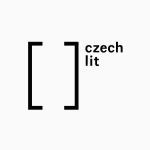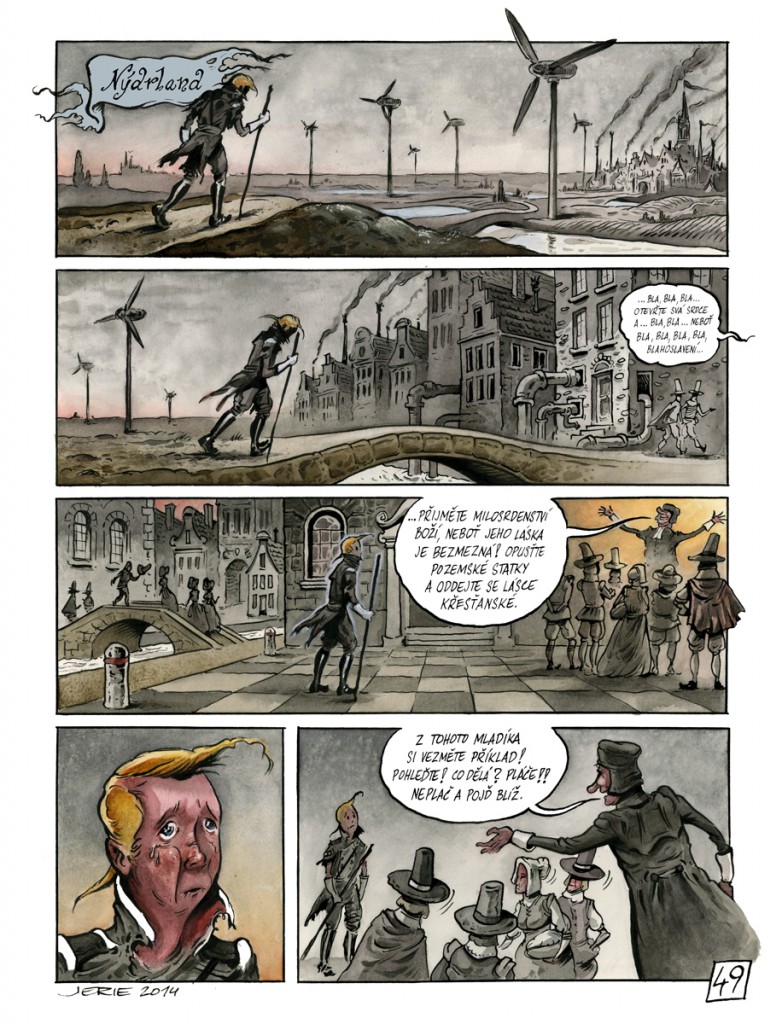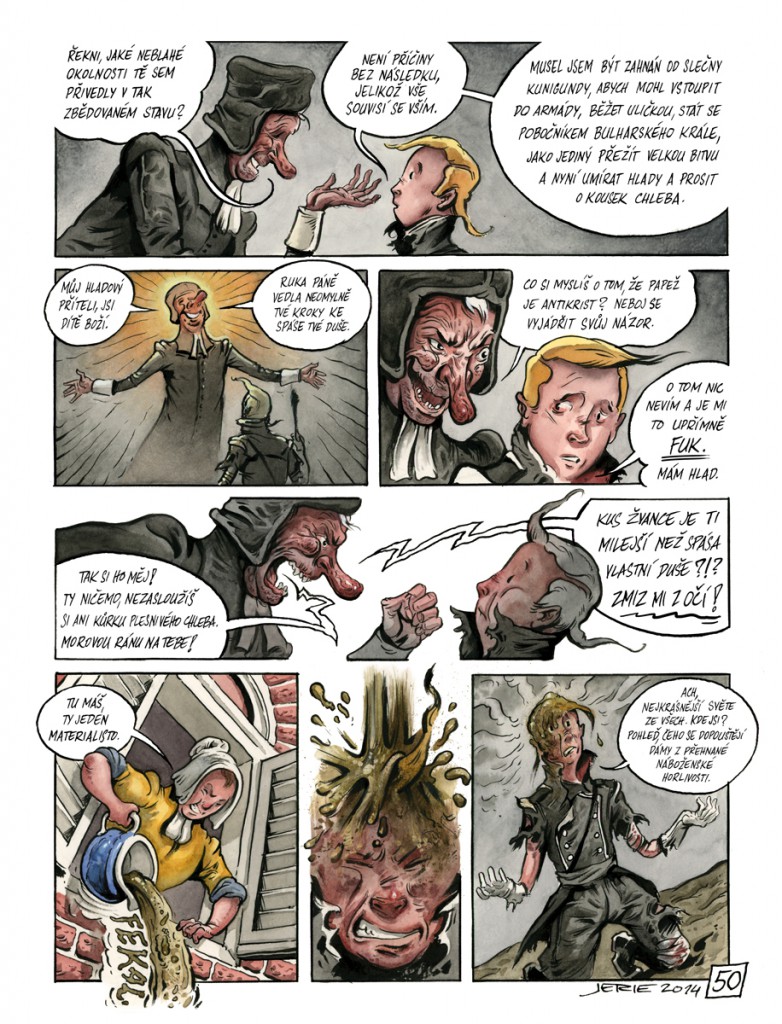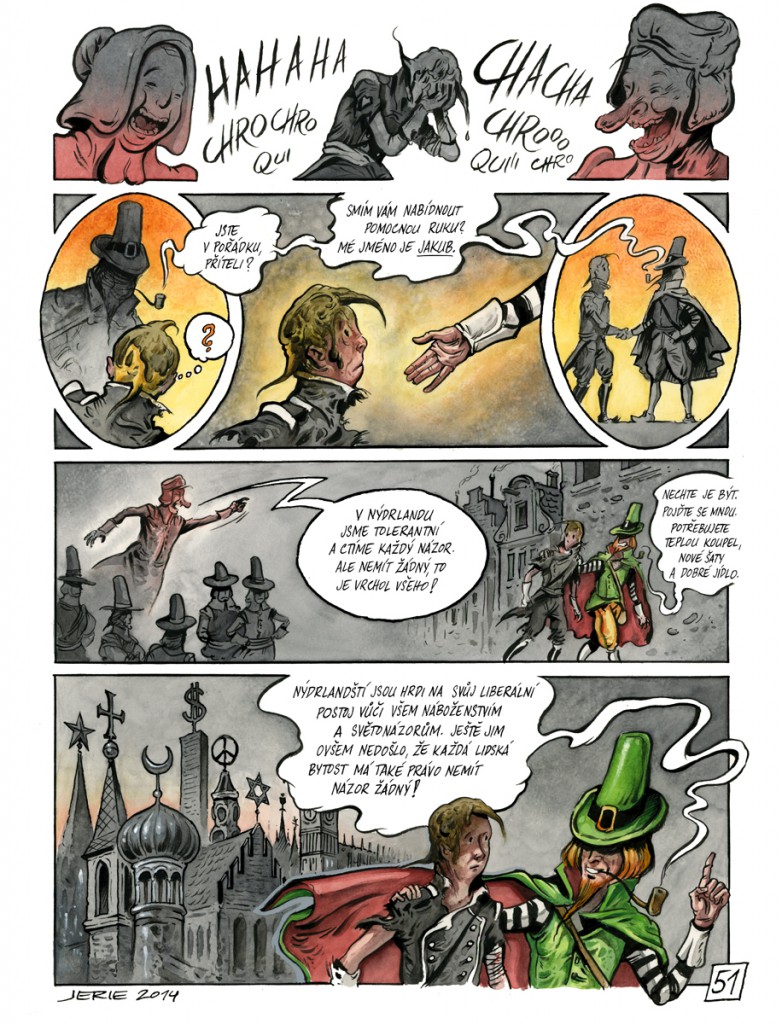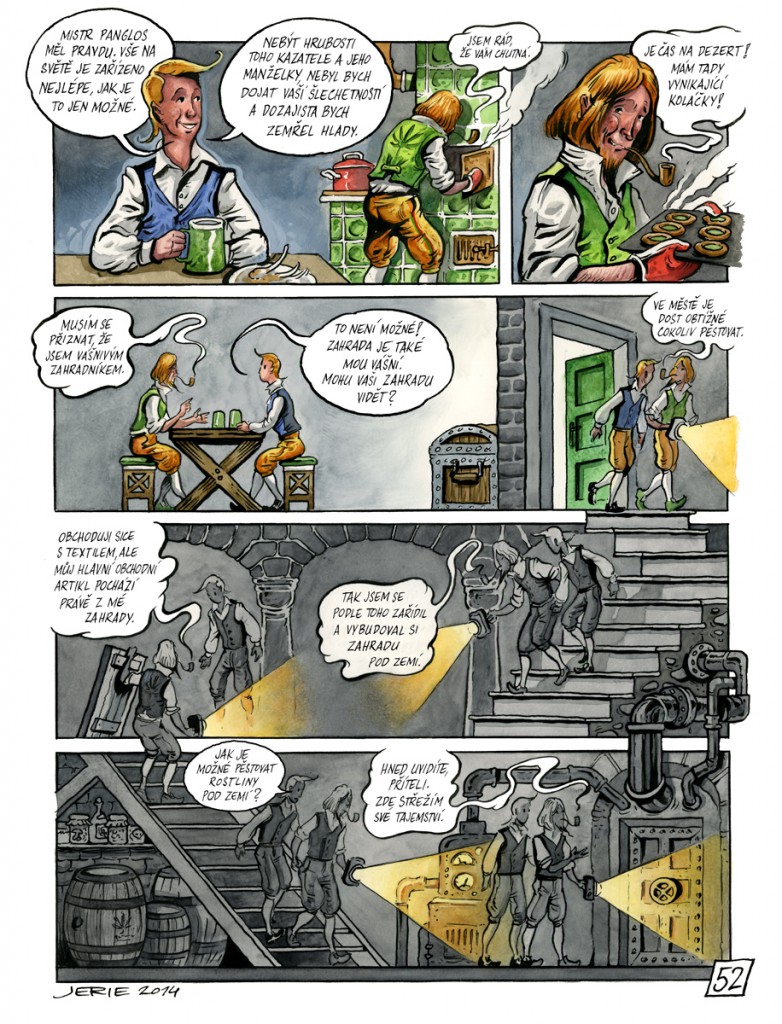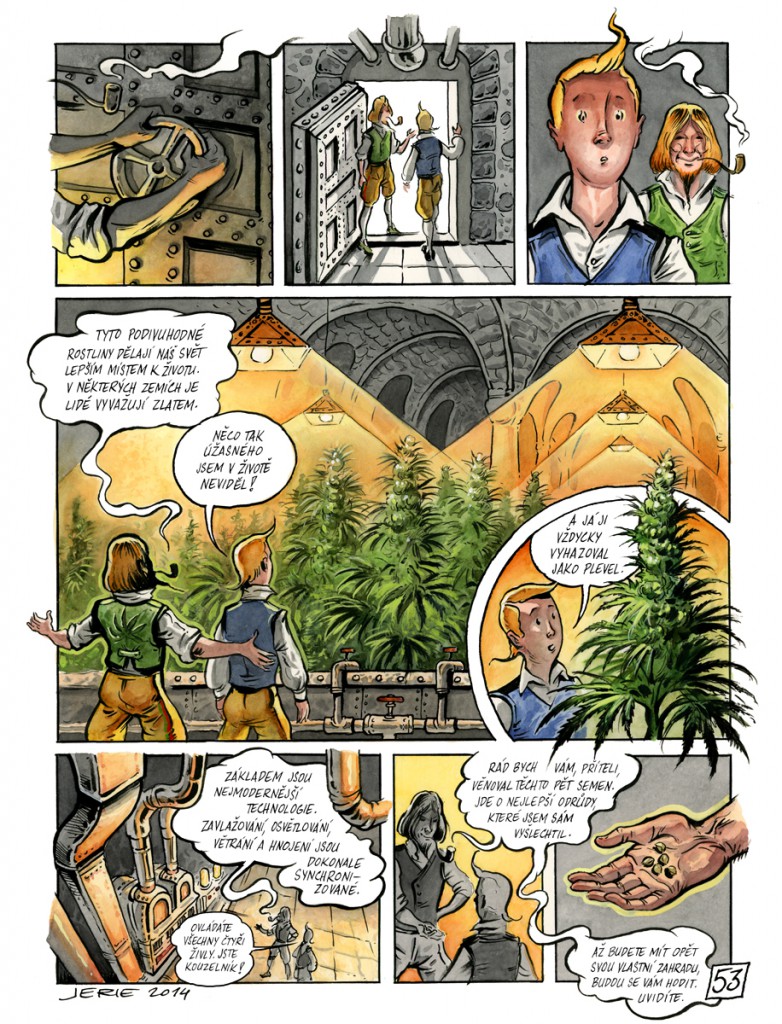For our final feature on the best books of 2015 (after literary fiction and children’s books), we have selected our favourite Czech sci-fi, fantasy, crime novels and thrillers. Some of the best-known Czech writers, including Kafka and Čapek, incorporated genre elements in their work, yet quality Czech genre fiction is now often overlooked abroad. We hope our selection of titles will help translators and publishers navigate the vast amount of popular Czech genre literature and that this will lead to more of these books reaching an international audience in the coming years.
Contents
Sci-fi/Fantasy
Miloš Urban: Urbo Kune
Martin Vopěnka: New Planet
Karel Jerie: Candide, Book Two — The Grand Inquisitor
Jan Šumbera: Headworld — By the Curious Pilgrim
Detective/Crime
Iva Procházková: The Zodiac Murders / Man at the Bottom
Štěpán Kopřiva: Quick-fire
Zdenka Hamerová: The Secret of Klejinka
Jiří Březina: Time-barred
Thriller
Pavel Renčín: Captive

Miloš Urban
Urbo Kune
(Argo, 372 pages)
Miloš Urban is one of the most famous Czech authors, whose translations have been published in many languages including English, German, Polish and Italian. He is especially popular in Spanish-speaking countries, where his books sell tens of thousands of copies. Winner of the Magnesia Litera award for prose, he is best known for his dark and atmospheric detective novels. In his latest book, Urban has applied his skills to the sci-fi genre. Mikuláš Jelen, a librarian, leaves his antique shop in Prague and travels to the capital city of Euroworld, Urbo, for a new job. However, he finds it hard to adapt to Urbo and has a growing feeling that the city lives its own secret life, hidden from society and the state. He can only hope that he will come to understand his role in the secret plan of the city before someone kills him. Part of a unique project of the same name which includes architecture, literature, film, art and music, Urban’s novel uses the sci-fi genre to address contemporary problems facing Europe.
Praise
“Although Urbo Kune is a sci-fi novel, it very clearly reflects the present day, and includes such pressing themes as mass migration and the influence of the internet on culture […] It is a novel filled with imagination, word play and anagrams, but also facts from various subject areas.”
— Jiří Lojín, VašeLiteratura
“There is no shortage of Urban’s characteristic mystery in Urbo Kune.”
— Dagmar Čechová, Blesk
Links
Author website: www.milos-urban.cz
Publisher: www.argo.cz
-
Excerpt ▼
Chapter 1.
“Mr Jelen? Hello. I’m Kratochvíl.”
“Hello.”
“You are Mr Jelen, aren’t you?”
“Mikuláš Jelen. Did Roman Rott send you? Or did Untermesser recommend me? What are you looking for?”
He laughed, shaking his head. “You don’t recognize me.”
“Should I recognize you?”
“Kratochvíl.”
“Sorry. I don’t know who you are, Mr Kratochvíl. Are you here for a book?”
“No, I’m not. We were at school together, remember? The elementary school in Schnirchova Street below Letná.”
“I don’t remember. Wait a minute… Boris? Your full name is Boris Kratochvíl, isn’t it?”
“We ought to call each other by our first names, Mikuláš, like we used to do. I can hardly believe that you wouldn’t recognize a classmate. Or are you just putting it on because you don’t want to recognize me?”
Thus spoke the man who walked into my shop at an exceptionally early hour: at seventeen minutes past nine, i.e. seventeen minutes after opening. Normal people don’t usually come in before midday.
What he had said was plain rude. Either you recognize me or you’re pretending. Nothing in between. How objectionable.
Yes, he did look familiar, now that I thought about it. The broad face of the ginger-haired, thickset boy who had gone around dressed like a petty official even when he was a child. It was still there in him. My classmate Boris.
“Sorry. It was a long time ago. I recognize you now.”
He looked at me, and I looked at him. It was awkward; I had always avoided encounters with former classmates, whom chance makes our fellow wayfarers in life for a short time; I kept myself to myself, independent of them. And so I made use of this rare opportunity and looked at myself through his eyes: inconspicuous even then (apart from the hand), a man of few means, a bachelor or a divorcé even then – that had already been written in his hand or his face at the age of ten. Now he’s about thirty-six. Zero to two children, maybe one child to support – with those nervous-looking eyes, he obviously didn’t intend to talk about that. He had opened a second-hand bookshop from a love of books, and before that he did this and that.
Career more or less non-existent.
Or did he know more about me?
“Hi, Boris.” I shook his hand. How long was it since I’d seen him? Twenty-five years? After a year of suffering in one class, fourth or fifth grade, he had moved away somewhere. I hated school. It was full of loud little people, all of them strangers. There were adult strangers there too, equally uncomprehending. Young or old, all of them looked at my hand when I went up to the blackboard.
“I imagine you’re looking for something,” I said. “I’d guess some erotica from the First Republic. Pictures or writing? Probably pictures, eh? I don’t have anything very interesting in stock, but I’ll make a note and ask around. Give me a month and I can get you anything you want. It also depends how much you’re willing to pay. Anything else?”
I found myself acting haughtily before I could stop myself.
“I’m not looking for a book, Mikuláš. I’m looking for you.”
“Really? Who told you about me?”
He made a face. “Nobody. You can find everything on the internet.”
“I don’t have a website,” I objected. Which was true. I refused to pay for that kind of publicity either in money or by accepting adverts. He smiled (a little too indulgently for my liking; he was putting on an act).
“Some people praised this little business of yours.”
“It isn’t a ‘little business’,” I protested, and Kratochvíl become more serious.
“Of course not, I’m sorry. Your second-hand bookshop has been in operation for quite a while, hasn’t it? A well-established business. It has excellent reviews. Don’t you read about it on the Net?”
“You guessed it.” (But the truth was that I enjoyed reading something positive about myself from time to time. I completely ignored negative reviews though, as soon as I came across a few critical words.) “But surely you didn’t look me up just to tell me that I run a good second-hand bookshop?”
“Maybe I did. You used to work in publishing.”
“That’s right,” I nodded.
“And you were also in the town library. For about three years?”
“Five years,” I admitted.
“Ordinary work, badly paid, lots of reading. Is anyone interested in this?”
“Always books,” he laughed, looking around at the shelves.
“That’s a good motto,” I said dryly. He stopped smiling.
“I came to tell you, Mikuláš, that I have a job for you. I’m offering you it.”
“I have a second-hand bookshop. That’s what I’m doing now. I don’t need a job. I’ve worked enough in my life.”
“It’s like you’re in retirement here,” he grimaced. “You’re thirty-five years old.”
“That’s nobody’s business but mine,” I snapped. I had been through enough. But I didn’t say that out loud. That was nobody’s business either. With his gaze fixed on the shelf marked CZECH FICTION, he mumbled that with the rent they wanted for this place I wouldn’t last long; a second-hand bookshop near the centre of Prague which didn’t focus on Pragensia, expensive fine-press publications and rare early printed books couldn’t stay in business for long. Then he named the amount which I pay the owner of the building each month.
The worst thing was that he was right. I could keep the shop going for another quarter of a year, but that was it. I was struggling to keep up with payments and a Russian had designs on the shop – he wanted to brew tea in a samovar and offer his compatriots the largest selection of second-hand books in Cyrillic script. From my selection of signs I chose one marked “taking delivery of books” and hung it on the glass door. People on the pavement passed by the shop window without even noticing. Above the shop I had a little room where I could rest, which was reached by a narrow spiral staircase. I invited Boris Kratochvíl upstairs and made coffee for him. I waited to see what he would say to me. And he launched into it and didn’t stop talking for a whole hour. This man, whom chance had once made my classmate and who had then disappeared from my life, had turned up here out of the blue and enthusiastically held forth about a phenomenal project which I wasn’t entirely unfamiliar with but until then hadn’t had any reason to take an interest in. It concerned a stone quarry near Prague, which at one time had been much talked about on television and written about in the newspapers – it was a big political issue. “Quarry brings new hope,” said the enthusiasts. “Hopes killed stone dead,” said the sceptics. It was a long time since it had been a quarry. A hi-tech housing development had been built there – cityhouse, it was called, or something like that. A social/urbanistic/political centre away from the centre of Prague and the Czech Republic, paradoxically belonging to the somewhat rural Prague district of Zbraslav but living entirely, and incomprehensibly, on its own terms, or rather according to the rules that were postulated by its founder, Zikmund Kůn. The fact that he got away with it cost about ten local and national politicians their head. Whether it also cost Kůn a good deal of money, nobody was able to pin anything on him. They didn’t manage it in time.
(Translated by Graeme Dibble)
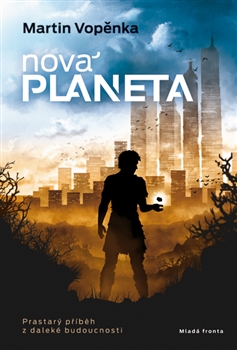
Martin Vopěnka
New Planet
Nová Planeta
(Mladá fronta, 624 pages)
Martin Vopěnka, whose books are often a combination of genre and literary fiction, is currently experiencing a very successful creative period. His previous sci-fi novel, The Fifth Dimension, was recently published in English and has received praise in both the Financial Times and the Times Literary Supplement. Vopěnka’s novels have also been translated into Russian, Arabic and Romanian. He studied nuclear physics, but since the 1990s has made his living as a publisher and writer. In his latest novel, Vopěnka focuses on societal inequality. The main character, twelve-year-old Daniel, grows up in a technically advanced but completely isolated civilisation, which is called New Planet. This dehumanised society is divided into the privileged and the unprivileged. The former pretend to have left Earth, but in reality they have only built an impenetrable wall around themselves. The privileged Daniel loves his three step-brothers without knowing they hate him. Due to their betrayal, one day he finds himself lying on a heap of corpses on the other side of the wall. There is no way back, so he has to fight for survival in the underdeveloped world outside. Soon he discovers the terrifying foundations the civilisation of the New Planet has been built on.
Praise
“New Planet is a remarkable bestiary of cruelty.”
— Petr A. Bílek, Respekt
“There are many novels about a desolate earth in world sci-fi. Vopěnka’s novel is valuable mainly because it forces us to ask questions. To what extent does a privileged group of people have the right to create a new world for themselves at the expense of billions of people from the old one?”
— Alena Slezáková, MF Dnes
Links
Author website: www.martinvopenka.cz
Foreign rights: www.praglit.de
Publisher: www.mf.cz
An excerpt can be found here.
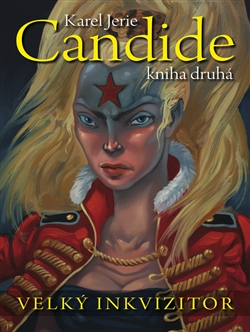
Karel Jerie
Candide, Book Two — The Grand Inquisitor
Candide, Kniha druhá – Velký inkvizitor
(BB art, 64 pages)
Karel Jerie is a cult figure in the Czech comic book scene. A classically trained painter, Jerie won first prize in the professionals category at the Polish International Festival of Comics and Games in Łódź and deserves the same attention that, for example, Jaromír 99, another legend of the Czech scene, receives abroad. In the Candide series, Jerie transforms Voltaire’s famous 18th century satire into a baroque-steampunk-space opera. In 2014, the first volume of the planned trilogy won two Muriel awards, the most prestigious Czech comic book awards. In the second book, the war-weary and disillusioned Candide reunites with Professor Pangloss who gives him a dose of bitter reality. An encounter with growers of fine cannabis in Neederland leads Candide onto a merchant ship which, however, crashes off the coast of Port Ugal. Once back on dry land, our hero has to deal with far more treacherous dangers — the ever-present bliss of the Grand Inquisitor, gallows and revolution…
Praise
“Karel Jerie continues the wild story of the first volume. Everything is excessive, overstretched, crazy, but also very enjoyable and cleverly connected with the original book by Voltaire. Jerie’s new book has a steampunk heartbeat in which the historical and futuristic are masterfully combined.”
— Stanislav Šulc, E15
“Both volumes of Candide prove that Jerie is an artist who is imaginative, playful — and mature. Many of his grimacing monsters — human or otherwise — will remain in the reader’s mind for a long time.”
— Pavel Mandys, iLiteratura
Links
Author website: www.kareljerie.cz
Publisher: www.bbart.cz
Illustrations

Jan Šumbera
Headworld — By the Curious Pilgrim
Hlavosvět – U Zvědavého poutníka
(Petrklíč, 360 pages)
Who would have thought that someone would choose a thirteen year old girl as an instrument to create a new world, a better world than our current one? But escaping from pain and suffering isn’t so simple, especially when there are people who shamelessly trample on the happiness of others while searching for their own. And would a world without evil be truly good? Children, old men, pixies, trolls, wolves, Creators, Artists of nature, all appear in Šumbera’s novel. Each character has their own unique Headworld and everything is connected by mysterious runes from the petals of extinct rune trees. This sophisticated novel is permeated with kindness and depth, leaving the reader in no doubt that it is an exceptional piece of literature, and not only within the fantasy genre. Headworld is the debut novel of a young author who is still relatively unknown, but what we do know is that Šumbera has attracted the attention of critics with his undeniable talent.
Praise
“The storytelling sometimes takes on surreal dreamlike qualities and imagery […] It is dominated by an almost automatic stream of speech which forms and tangles the world of the narrative.”
— Pavel Janoušek, Tvar 4/2016
Links
Publisher: www.petrklic.info
-
Excerpt ▼
The leaves quivered quietly. He opened one eye and then the other, then woke up. Alemen was still sleeping. He quietly left the network of branches. Suddenly he sensed something new. All around him he could see a flow of energy. He felt the colossal tree pulsing with powerful energy.
“Is that you?” he said inside his mind. “The sage who transformed into a tree?”
“Yes, Ollváni, it is me. How is it possible that you can sense me?”
“I don’t know. Something has changed. Overnight.”
“Just as I thought.”
“The world is completely different. Somehow more alive.”
“Climb down, lad, and let Alemen sleep.”
It was a fresh morning. Here and there rays of sunshine penetrated the branches and lit up the inside of the tree like a kaleidoscope. Ollváni quickly jumped down to the lower branches. The strange smell disappeared into the background and he could distinguish a wild energy shimmering in the air. The old man was waiting for him on the wide lower branches. Ollváni went over to him and he reached out his hand.
“Pleased to meet you, Ollváni.”
Ollváni knew that it was Enten Filigrán, the old man who had transformed into a tree. He looked at him in amazement. He could feel the pressure of his hand perfectly. Enten smiled.
“See how perfect your imagination is? How real I am? And that’s just the beginning. Now I will be able to teach you and make a Creator out of you. And you know how a student repays his teacher?”
“No,” whispered Ollváni in wonder. He knew about Creators from the book The Awakening and he admired them.
“He surpasses him,” smiled Enten. “And I’m sure that’ll happen soon.
“How is it that I can perceive everything so clearly?”
“It’s thanks to Celkel. He underwent an initiation in the Land of Self-Realization. Now it is certain that a Creator slumbers within you.”
“Thanks to Celkel? How am I connected to him?”
“I wouldn’t want to deprive you of finding that out for yourself,” said the old man mysteriously. “And what’s more, it will be beneficial for your relationship.”
“And can I go and see Celkel now?”
“Yes, lad. I think that would be appropriate. However, I’d like to explain about the powers you’ve acquired.”
“Can we do it now?” Ollváni was very impatient. He wanted to see Celkel as soon as possible.
“Yes. I’ll tell you everything which I think is of vital importance. You might not understand everything now, but when you experience it for yourself, everything will be clear to you. The Dream has awoken inside of you. The Dream is the beginning of a Creator’s spiritual development. Your mind opened up thanks to the pilgrimage which Celkel undertook. Otherwise the Dream would have appeared much later – fifteen years of age at the earliest. The depths of your mind began to filter through to the surface, and energy pathways in your brain and body began to mature and develop.”
“And what is this Dream?”
“It is the essence which is common to all people. But it is so deep that only a Creator can embrace it. It is so peculiar that if anyone other than a Creator attempts to delve into it, their mind will be lost in a whirlwind of ideas, and suddenly their mind will be unable to recognize what is real and what isn’t. Such people go mad. Do you know who the Bluenans are?”
“The blue angels of ruin?”
“You could call them that. They are tasked with searching for a Creator and awakening the Dream within him. Whoever looks at them must uncover Depth in his mind.”
“And is it really just a Dream?”
“Yes and no. It is as real as everything around us, but at the same time it is only a dream.”
“And who dreams it?”
“A young girl who is only a couple of years older than you. She is from the Ejimén family. Over history this family amassed an incredible spiritual wealth. They were people who, above all else, cultivated purity of thought and propriety of behaviour.”
“What does that mean?”
“They belonged to the Nature Artists. They lived in perfect harmony with nature in the city of Lezeb. They did everything in order to be pure beings. They were able to delve very deeply into the wellspring of human action. This predestined them to be able to see even the darkest recesses of the mind and heal them. What is more, the openness that the Nature Artists acknowledged meant that they could not hide anything. The girl isn’t entirely of pure blood because the Ejimén family died out. She doesn’t know anything about them. However, the mission which the Ejimén family made their own lies deep within the girl. The depth of her soul is filled with the atmosphere and methods of their way of thinking, their passions and myths. It is as large as our world. And our world is slowly evolving to become the image of this mind. We also come from it. Our world absorbs it and materializes it to become its image.”
(Translated by Graeme Dibble)
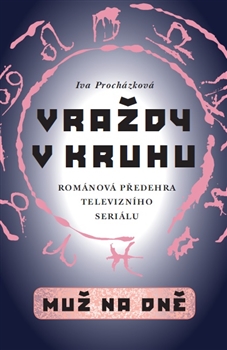
Iva Procházková
The Zodiac Murders / Man at the Bottom
Vraždy v kruhu / Muž na dně
(Paseka, 335 pages)
Are you a fan of Jo Nesbø or the Danish-Swedish series The Bridge? Then you’re sure to enjoy Procházková’s newest novel. Although the book was published at then end of 2014, its popularity increased significantly in 2015 when it was turned into a successful Czech television series. A Polish translation of the novel will be published this year by Afera as the first book in a Czech crime series. Procházková is the recipient of many awards – five Golden Ribbons, two Magnesia Literas in the category of books for children and youth, as well as the most prestigious German award for children’s books, the Friedrich Gerstäcker Award. Her books have been translated into many languages, especially German. In The Zodiac Murders, a myriad of peculiar people surface around a dead man found in a lake: from a cannabis grower to a famous architect, a promiscuous cop to a mysterious woman from Cuba. How many motives can one murder have? We follow the unorthodox criminologist Holina as he struggles through the maze of the investigation. At the same time the novel looks deep into lives connected by a mesh of strong emotions and contradictory actions.
Praise
“The clever, realistic, skilfully constructed and in many ways unconventional plot is one of the best to be found in Czech detective novels in recent years.”
— Pavel Mandys, Hospodářské noviny
“The author’s narrative style is elegant in the way it gradually dispenses information, is attentive to nuances in character and able to work with a wide range of settings.”
— Vítek Schmarc, Respekt
Links
Author website: www.ivaprochazkova.com
Publisher: paseka.cz
-
Excerpt ▼
Jáchym had an inkling Stinker would arrive, even though it didn’t usually happen on Sunday afternoons. Hemp day was traditionally a Saturday, sometimes a Friday, as well as all the holidays. People didn’t just want grass at New Year, but also at Easter and on the first of May. In Kladensko, Jáchym made sure there was a good mood for every season of the year and all weathers, and insiders knew it. Unfortunately Stinker knew it too.
He removed his surgical mask, cleaned the sprinkler and took off his gloves. It hadn’t rained in a while and the pests in the orchard had multiplied over the past few days. They were also in the vegetables. Caterpillars, gall midges and flea beetles. However, the greenhouses where the hemp was grown maintained a high humidity, which was the best prevention against mites. In May some spider mites would show up and they could be gotten rid of easily with neem oil before they started to form colonies. Now the plants appeared healthy and were growing quickly.
A green van turned into the entrance. Milan came twice a week for fresh lettuce, which he then distributed to restaurants. He also used to take carnations, but after his mother moved to Nymburk Jáchym stopped growing them. He wanted time to do the things he enjoyed the most.
“So you’ve caught up with me again,” said Milan as soon as he got out of the van. “Happy birthday! When are you going to celebrate?”
“I might give it a miss this year. It’s not a special birthday.”
They were the same age. Milan had celebrated his 32nd birthday at the start of spring, and Jáchym was used to combining his birthday celebrations with the solstice. He enjoyed having a party under the stars. He’d invite his friends over and they’d sit in the garden, have a barbecue, sing and play the guitar. Quite often they’d stay up till morning and Jáchym would have the feeling that they were connected by something bigger than their little lives. He and his friends never talked about God, but those nights spent together under the stars were filled with love. This year there was no thought of having a party. Because of Stinker.
“How’s your dad?” he asked as he was passing Milan a tray of lettuce.
“He’s holding on.”
Jáchym had known old Stašek since he was a child, when he took them to football training. Now he was seventy with advanced Parkinson’s, and in the autumn Jáchym would send him some hemp roots. Milan’s father made a syrup from them, which helped him fight the illness through the winter. During the growing season he chewed the fresh leaves. Jáchym had them all ready for Milan. They were freshly picked.
“Dad’s really grateful to you,” said Milan when he was paying for the lettuces.
“He can only cope because of the hemp. Nothing else helps him.”
Jáchym nodded. He knew the power of hemp, though he never took money for the roots and leaves he gave to Mr Stašek. Occasionally, though, Milan would bring him a small treat. Today he brought a cake box out of the van.
“There was a wedding in the family, so here’s a little something for you.”
Jáchym opened the lid. The box was full of small cakes and pastries. He thanked him and put one in his mouth.
“And what about you? When are you going to take the plunge with Hedvika?” asked Milan.
“Soon. Maybe in the autumn.”
“Tell her I’m asking for her.” Milan got into the van, reversed onto the road, waved goodbye to Jáchym and drove round the wall of the farm towards Kladno. Jáchym watched him go. The mention of Hedvika had quickened his pulse. He started thinking about Stinker again. I can’t have him behaving that way. He would have to take him down a peg or two. But how? Stinker was dangerous. And intelligent. He had managed to hide his dark side as cleverly as everything else. He had the right face for it: manly, well chiselled, honest, with blue eyes and crow’s feet, giving the impression that he smiled a lot. But he almost never smiled. His eyes followed you like a cobra’s.
Jáchym wondered how many people realized what a low life lurked behind that mask of honesty. Stinker. He went into the house, walked along the hallway and stuck his head into the room. Hedvika was lying on the sofa. Her eyes were closed, but he knew she wasn’t sleeping.
He sat down beside her, cake box in hand.
“Milan sends his best,” he said. “Fancy some wedding cake?”
She turned her head sharply to the other side. The ear that she had been lying on was bright red. He stroked it with his fingertips.
She flinched.
“What are you going to do?” she asked.
“What do you want me to do?” he replied.
“Kill him.”
His father had always said that good should overcome evil. But sometimes there is no choice.
“All right.”
She opened her eyes and looked at him hard. Then she grimaced.
“You don’t mean it.”
(Translated by Graeme Dibble)
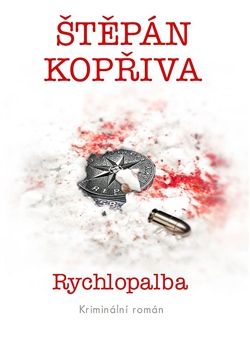
Štěpán Kopřiva
Quick-fire
Rychlopalba
(Crew, 376 pages)
A classic hard-boiled detective story by an expert in the genre, which has been nominated for the best Czech detective novel of the year award. Kopřiva is a freelance author and screenwriter, co-author of Nitro (Nitro těžkne glycerínem), the first Czech comic book to achieve success abroad, and co-founder of the Crew magazine and publishing house. What would you do if the police rang your doorbell one evening and told you that for years you had been unknowingly hurting your child? Or if psychiatrists told you that you suffer from a personality disorder and sent you to an insane asylum? That’s exactly what happened to Olga Turnečková. And although the people around her initially supported her, they eventually accepted that she really did torture her own daughter. But then Olga’s brother discovers a clue that things might not be quite as they seem and hires a detective who will stop at nothing to uncover the truth.
Praise
“An unexpectedly credible and well-structured hard-boiled novel.”
— Pavel Mandys, Hospodářské noviny
“Alongside an ordinary police patrolman we delve into an inner labyrinth, into a darkness which chills to the bone. For the author to be able to create this journey with such ease and trenchant humour is exceptional.”
— David Jan Žák, Českobudějovický deník
“If you’re looking for a Czech detective novel, then it has to be Štěpán Kopřiva’s Quick-fire.”
— Iva Lutonská, Kultura21.cz
Links
Publisher: www.crew.cz
-
Excerpt ▼
The body lay in the kitchen. It wasn’t a nice kitchen and the body wasn’t much to look at either.
In Tom and Jerry, when Jerry batters Tom with a frying pan, a funny big lump swells up on his head. This woman’s brain had come out of her head. Not particularly amusing.
The culprit must have hit her several times with the frying pan. And when I say several times, I mean about fifty times. Her skull looked like a melon that someone had thrown from the eighth floor.
It showed that the frying pan was expensive. That means heavy. From steel and iron. It could easily have weighed two kilos.
“We have that kind of frying pan at home,” said Holub. “It’s a good one.”
“Yeah?” I said. “Zdenka and I were thinking about getting a similar one. Would you recommend it?”
“Do you see that checked pattern? That’s a nonstick surface. Titanium or something. And this red circle in the middle shows you when it’s hot. Magda does steaks for me on it.”
“Watch out that she doesn’t start doing brains,” I said, nodding towards the grey splatter on the floor.
“I wouldn’t worry about that,” said Holub.
“No? Cos you love each other?” It was hard not to be cynical, especially after this morning. But I was trying not to be.
“No, because Magda isn’t patient enough for this kind of thorough work. She would hit me once and that’d be it. To give someone a pounding like this, that person would really need to get on your nerves.” Holub thought for a moment. “Well, OK, maybe she’d hit me twice. Or five times.”
“You’re right, this pig really took the job seriously,” I admitted. “A thorough guy.”
The thorough guy was beng guarded by Richter and Slídová next door, in the living room. He was sitting on the leather sofa wearing slippers; he had a well-trimmed moustache, his fingers were yellow from nicotine and he was shaking uncontrollably. The husband. Exactly according to the statistics: in 95% of cases the culprit is a member of the family. The guys from homicide referred to these cases as domestic butchery.
“Oh yeah, build up your strength, swing, you’re a success,” said Holub, blowing his nose. “Good work for a right-hander.”
“A left-hander.”
“Eh?”
“He had the frying pan in his left hand. Look at the angle. And also which side of the head is more flattened.”
A white cat observed us from the kitchen units above us, ostentatiously licking its paws as though to show how he was washing his hands of the whole mess. Apparently the reincarnation of Pontius Pilate.
“I trust you’ve managed to trample all over the place,” came a voice from behind us. “Can you explain to me why you came into the kitchen?”
We turned round. Behind us stood a fat guy in jeans and a bomber jacket. This was a real giveaway. Almost everyone in homicides wears a bomber jacket; it’s their unofficial uniform. I had never seen the fat guy before – but there was nothing strange in that. I hadn’t been at many murders yet.
“We’re securing the crime scene,” reported Holub. “Until the response team arrives.”
“It’s just arrived,” said the fat guy, pointing his thumb at his chest. “And it certainly doesn’t need two local uniformed plodders messing up all the clues.”
We usually got on well with the investigators from the CID, mainly because as a rule they barely even noticed us. Fatty here was an exception. He noticed us all too much. “So, are you going to get out of here or what?”
Obediently we went around him into the hallway, leaving him to lord it over the crime scene. I saw Richter in the living room, standing above the husband, thumbs hooked into his belt, his peaked cap genially pushed to the back of his head. We exchanged glances; Richter looked towards the kitchen and mouthed the word Prick.
“When I said get out,” said the fat guy, leaning out of the doorway, “I didn’t mean just head into the hallway, which is even smaller than the kitchen. How do you think the technicians will get in when they want to take fingerprints and footprints? I meant get out completely. Out of the flat. Out of this case. Don’t you have some really important work to do? Like chasing some fuckers who steal manhole covers or something? Don’t worry, we can secure the scene ourselves.”
“I can see that,” I said, pointing into the kitchen. Pontius Pilate had jumped down from the cupboards and was licking the spilled brains from the floor behind Fatty’s back.
Fatty turned round. “Oh, for fuck’s sake! Shoo! Horrible old moggy! Fuck off!”
We left too.
(Translated by Graeme Dibble)
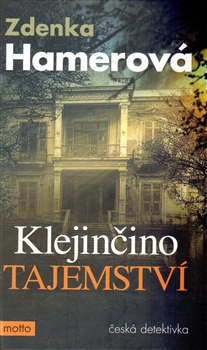
Zdenka Hamerová
The Secret of Klejinka
Klejinčino tajemství
(Motto, 328 pages)
Hamerová is an experienced author, popular with readers and critics. Her latest book, The Secret of Klejinka, has been nominated for the best Czech detective novel of the year award. Tina has remarried and is starting a new life with her second husband, Martin, and their three sons. They have bought a run down hundred-year old villa, which the locals call Klejinka. While Tina’s family is happy in their new home, she feels that the villa hasn’t accepted them and everything is plotting against her. Tina begins to investigate the history of the villa to find out what is really haunting her, but then death strikes…
Praise
“Readable, humorous and written with a light touch […] Hamerová knows how to write and create a nightmarish atmosphere, while the relationships between the thirtysomethings are realistic.”
— Juan Zamora, iLiteratura
“I would confidently compare Zdenka Hamerová to the Swedish author Camille Läckberg […] Hamerová is a genuine master at combining horror with humour.”
— Veronika Černucká, SeverskéDetektivky.cz
Links
Publisher: www.motto.cz
-
Excerpt ▼
“Dušan, you didn’t have an argument, did you? It looks like she’s gone off to sulk. If she’s inside, she must have heard us looking for her,” said Alice, gradually opening all the doors with Dušan. They peered into the empty, musty rooms, which Tina wouldn’t have gone into for all the money in the world.
“No, we don’t usually argue,” he replied, opening up a large room with a balcony. “Eva just isn’t here,” he groaned.
“And have you checked downstairs thoroughly? Are her coat and shoes there? She can’t just have been swallowed up by the ground! Maybe she went for a walk,” suggested Alice.
“She wouldn’t have gone without me!” shouted Dušan, his voice starting to break into a sob.
“Dušan,” said Tina, holding him gently around the waist. “Why are you so upset? Maybe someone else made her angry?”
“No! I don’t understand what’s happened. I’m so worried about her!”
“The balcony door is open,” remarked Alice. The loose old floorboards creaked with every step she took.
“I thought so. I could feel a draught,” said Tina, stretching her neck out to see. “Close it, seeing as you’re there,” said Tina to Alice.
“I’ll have a look outside,” said Alice. “Maybe she’s wandering about in the park and I’ll catch sight of her. Was she very drunk?”
“She didn’t seem to be,” answered Tina. “And don’t go out onto the balcony. The railing is coming away, and I wouldn’t trust that floor either. Klejinka’s really dilapidated on this side.”
But it was too late. Alice was already standing on the balcony. “You’re right. Part of the railing is missing,” she shouted.
“Come back right now!” ordered Dušan, walking over to Alice.
“Alice, are you mad or what?! It’s freezing. Come back!” complained Tina, who realized she was on her own. She looked furtively around her.
“Jesus Christ!” cried Alice.
“What is it?! Come back at once!” screamed Tina hysterically as either a loose stone or a piece of the facade fell. “Alice, you’re scaring me!”
Now Dušan was on the balcony as well. “It won’t hold you, you idiots! Don’t go near the railing! Come back right now!”
“Oh, no! Eva, no!” cried Dušan, wailing like an injured animal.
“What’s happened?” asked Tina as Alice emerged from the darkness of the large parquet-floored room, ashen-faced and with shocked, shining blue eyes.
“I think Eva’s fallen. She’s lying down there, below the balcony,” she said in a deep, expressionless voice. “We have to help her.”
“Wh-What? What are you talking about?” cried Tina as the meaning of her words began to sink in.
Dušan came back into the room, curled himself into a ball and sobbed.
“Stop wailing and get up, Dušan! We have to help her!” screamed Alice, and she pulled him wildly by the arm until he finally got up.
“How are you going to help her? Are you blind or something? She fell from that stupid balcony,” sobbed Dušan. “No-one can help her now! She’s dead!”
Dead? Tina’s throat was gripped by horror. She just stood there with her arms at her sides, her mouth wide open.
(Translated by Graeme Dibble)
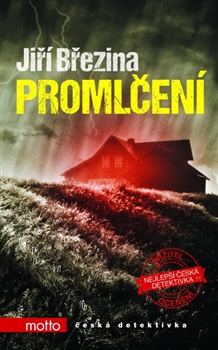
Jiří Březina
Time-barred
Promlčení
(Motto, 248 pages)
Březina won the best Czech detective novel award in 2013 for On the Hill (Na kopci) and his latest novel, Time-barred, has been nominated for the award this year. It is the first volume of a planned series of books about detective Tomáš Volf. While studying time-barred cases, the young detective discovers a strange death which took place in 1991 in a small village near the Austrian border. When he comes across a second suspicious death, Volf decides to question a man who was involved in both investigations. Through the man’s memories, Volf tries to uncover information which has mysteriously disappeared from the files. But can he trust the man who has since become a notorious politician? What role does the history of this forgotten region play in the case? And how many layers will Volf have to uncover to reveal who got away with not one, but two murders all those years ago?
Praise
“Březina has written a quality detective novel.”
— Jan M. Heller, iLiteratura
“Time-barred is a very good crime novel about unforgotten memories.”
— Václav Grubhoffer, Českobudějovický deník
Links
Author website: www.jiribrezina.cz
Publisher: www.motto.cz
-
Excerpt ▼
“My door is always open to the police, Mr Volf.” Novotný’s smile was slightly wider and his handshake a little more forceful than was natural. In real life he didn’t come across as well as he did on his election posters.
A corpulent, ruddy-faced bigwig. Expensive sports jacket with a T-shirt underneath, and under the T-shirt a well-padded belly. Fashionable glasses which didn’t seem to suit his face. No doubt some stylist had told him how to dress – something to show how modern and dynamic he was.
Now he was sitting at his designer table, devoid of any features that suggested work, smiling at Tomáš with his professionally taught grin. Behind the glass door to the politician’s office, over-caffeinated marketing experts and shady operators darted about, apparently all part of the Liberals’ election staff. But it was quiet inside the office.
“How can I help you?” asked Novotný, looking at his watch.
Tomáš knew that he had to tread carefully. There were only a couple of weeks left until the early elections. If the polls were right, then Novotný would be the man Tomáš ultimately answered to. Minister of the Interior.
“Thank you for finally seeing me. Perhaps you can help me with one issue.”
“So apparently you’re here because of an old case.”
“Yes, that’s what I wrote to you in the email.” Tomáš opened his bag. He placed some yellowed papers onto the table. “I was trying to sort out the files from regional headquarters and I came across this. Pasečky, 1991.”
He looked closely at Novotný. The politician didn’t react. He appeared to be disinterested. Like a man hearing the name for the first time.
Tomáš thought about the last few weeks when he had been trying to get in touch with this man. When he called here, Novotný never answered the phone. Volf always spoke to people whose only role seemed to be to deflect all conversations away from Novotný.
Novotný never replied to his emails either. Then in one of his messages he mentioned the place Pasečky. Within a few minutes he received a reply – a negative one.
Tomáš didn’t give up. He acted properly but persistently. He kept on asking until he received an email which might be construed as an invitation.
He sent the email on to Novotný’s assistant and attached a request for a meeting. And it worked. That was two weeks ago.
“The file that I’m here about isn’t complete. And according to the records, you were the last one to look at it.”
“Really?” Novotný looked at the ceiling for a moment as though he was finally remembering something. “You could be right. But that was a good few years ago.”
“It was. You looked at it in 2009. I’d like you to fill in a few small details about this case.”
Novotný lifted his arms. “Of course, fire away. However, I can’t promise you that I’ll remember everything.”
Tomáš smiled. “I understand. Why did you ask to look at the file that time?”
Novotný stood up and went over to the cabinet. He reached behind some jackets that were hanging up and with a slightly guilty smile brought out a bottle of whisky and two glasses. When he saw Tomáš’s gesture of refusal, he put one glass back and poured out one for himself.
“After all those years, I wanted to remember. I wanted to remind myself of my first case…”
(Translated by Graeme Dibble)
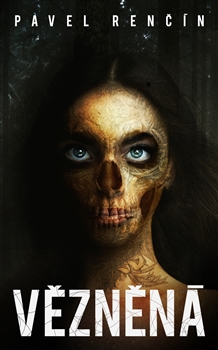
Pavel Renčín
Captive
Vězněná
(Argo, 236 pages)
Captive is one of the few novels combining horror and thriller penned by a Czech author and published by one of the most prestigious Czech publishing houses. Renčín has won three Aeronautilus awards for authors of science-fiction, fantasy and horror and is a prolific writer. His most recent novel was inspired by true events and is Renčín’s best thriller to date. The reader is plunged into the stifling atmosphere of solitude, wild nature and evil, beyond human comprehension. Secondary school teacher Marin suffers from nightmares and strange memory lapses. He feels as if an invisible swamp was dragging him down and begins to have uncontrollable fits of rage. Then the spectre of a dead girl who he feels he recognises appears in his bed. When reading the novel you might be reminded of the works of Stephen King, which have a similar eerie atmosphere.
Praise
“Captive by Pavel Renčín stands out in the Czech Republic due to its unusually vicious darkness.”
— Blesk
“During the short time that it’s been around, Captive has managed to attract an unexpected amount of attention […] We need many more books like this.”
— Jáchym Šidlák, Sarden
Links
Author website: www.pavelrencin.cz
Publisher: www.argo.cz
-
Excerpt ▼
CHAPTER I
I awoke, and when I abruptly opened my eyes a darkness entered, occupying my entire soul…
I lay on my back on the wide bed and above me hung the ceiling, just one shade of grey lighter than the walls of the room. Fragments of a dream, which I couldn’t remember but which had left me with a gnawing sense of anxiety, slowly began to fade and I realized that I was at home in my flat in Pankrac. I listened to my own breathing, which tore the silence like a blunt knife, and I could also hear, from the giddy height of the thirteenth floor, the distant hum of the night-time motorway. From the railway yard came the metallic clanging of the goods trucks and the clinking of the tracks, which found their way into my room despite the locked window. It must have been well after midnight – pitch dark outside and not a trace of morning. Whilst part of me was trying to figure out what had woken me up, another part was succumbing to drowsiness and I slowly began to fall asleep. Then I heard it again:
A scratching in the hallway.
What could be scratching in the hallway at three in the morning? All thoughts of sleep quickly left me. The room had frozen into immobility. There was the ticking of the clock on the wall beside the door. Dust settled on the clothes horse, whose struts stretched out like the legs of a daddy-long-legs. Moonlight pushed its way through a gap in the curtains, falling onto a pile of magazines on the bedside table, with a three-month-old copy of Reflex on top. On the wall beside the display cabinet hung the skin of a monitor lizard, a pointless souvenir from a trip to India. The lizard stared at me with his dried-out eyeballs, which seemed to say: knock, knock, you have a visitor, my friend.
Then it occurred to me that perhaps the girl I lived with had gone to the toilet. This had almost reassured me when I turned over and saw the blanket outlining her body. She lay next to me, silently and without moving. Before I had time to think, the sounds from the hallway came again, more clearly than before. The shuffling of feet.
I held my breath and didn’t utter a sound. I fixed my gaze on the closed bedroom door, afraid to move. Someone was prowling around in my flat. It was like a nightmare I had had many times before, except this time it was real. There was a stranger here and I was lying on my back in my bed, defenceless, frozen with fear. The steps came to a halt in front of the bedroom door. Terror pushed me down into the bed. My heart was pounding like crazy.
It flashed through my head that I might have some kind of weapon to hand, perhaps I could use the clothes horse, or maybe I had left a knife on the bedside table after supper… I was hypnotized by the door handle; I couldn’t tear my gaze away from it. Was it just my imagination or was it slowly moving downwards? My fingers trembled uncontrollably. The handle reached all the way down, and between the door and the dark space of the hallway a crack began to widen. With a certainty known only from dreams, I knew that there was something terrible behind the door…
I turned towards the woman… I wanted to wake her up, warn her, shake her, rouse her…but I couldn’t. It was too late.
The door was open and behind it awaited the darkness. I screwed up my eyes and tried to look through it, but I couldn’t, and when I heard those scratchy steps, that shuffling, careful treading, moving towards me, I couldn’t stand it any longer and I cried out. I leapt out of the bed and reached for the lamp, which I clasped onto like a mace. I threw myself at the unknown assailant, but I didn’t notice a cable running just above the floor. I tripped and collided with a chair, falling headfirst. I instinctively put out my arms, but my hands just hit the clothes horse, which gave way under the weight, and I crashed into the wall, stars spinning in front of my eyes.
Perhaps I lost consciousness for a moment. When I finally got to my feet again, I felt a huge bump on my forehead. I turned on the light, which flashed painfully into my eyes. The bedroom looked as though a bomb had hit it. The clothes horse was overturned and twisted, the lamp was broken, and the cable to the computer was ripped out from the wall, taking with it the plug point, which was giving off a few sparks. The night visitor was nowhere to be seen.
The light gave me enough courage to creep into the kitchen for a knife. I gripped it tightly as I went through each room one by one. I put on all the lights and even opened up the wardrobe. I checked the front door – all the locks were intact and the safety chain was in place.
(Translated by Graeme Dibble)
[ ]
